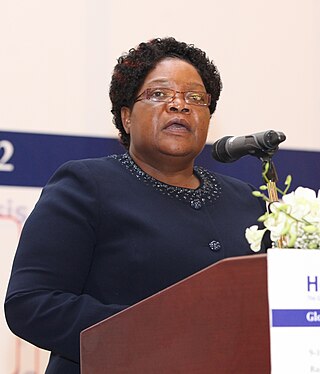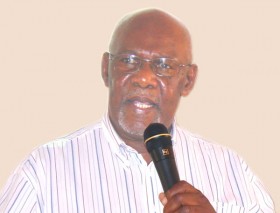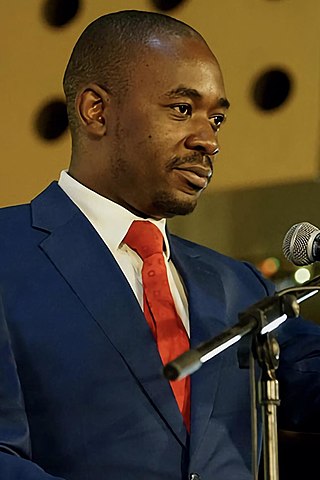A two-party system is a political party system in which two major political parties consistently dominate the political landscape. At any point in time, one of the two parties typically holds a majority in the legislature and is usually referred to as the majority or governing party while the other is the minority or opposition party. Around the world, the term has different meanings. For example, in the United States, the Bahamas, Jamaica, and Zimbabwe, the sense of two-party system describes an arrangement in which all or nearly all elected officials belong to either of the two major parties, and third parties rarely win any seats in the legislature. In such arrangements, two-party systems are thought to result from several factors, like "winner takes all" or "first past the post" election systems.

The Gukurahundi was a genocide in Zimbabwe which arose in 1982 until the Unity Accord in 1987. It derives from a Shona-language term which loosely translates to "the early rain which washes away the chaff before the spring rains".

The Zimbabwe African National Union – Patriotic Front (ZANU–PF) is a political organisation which has been the ruling party of Zimbabwe since independence in 1980. The party was led for many years under Robert Mugabe, first as prime minister with the Zimbabwe African National Union (ZANU) and then as president from 1987 after the merger with the Zimbabwe African People's Union (ZAPU) and retaining the name ZANU–PF, until 2017, when he was removed as leader.

The Christian Democratic Party is a Christian democratic political party in Chile. There have been three Christian Democrat presidents in the past, Eduardo Frei Ruiz-Tagle, Patricio Aylwin, and Eduardo Frei Montalva.

The Zimbabwe African People's Union (ZAPU) is a Zimbabwean political party. It is a militant communist organization and political party that campaigned for majority rule in Rhodesia, from its founding in 1961 until 1980. In 1987, it merged with the Zimbabwe African National Union-Patriotic Front.
An electoral alliance is an association of political parties or individuals that exists solely to stand in elections.

Joice Runaida Mujuru, also known by her nom-de-guerre Teurai Ropa Nhongo, is a Zimbabwean revolutionary and politician who served as Vice-President of Zimbabwe from 2004 to 2014. Previously she had served as a government minister. She also served as Vice-President of ZANU–PF. She was married to Solomon Mujuru until his death in 2011 and was long considered a potential successor to President Robert Mugabe, but in 2014 she was denounced for allegedly plotting against Mugabe. As a result of the accusations against her, Mujuru lost both her post as Vice-President and her position in the party leadership. She was expelled from the party a few months later, after which she formed the new Zimbabwe People First party.
The Party of Independence and Labour is a socialist and formerly communist political party in Senegal. For years it was led by Amath Dansokho.
Gibson Jama Sibanda was a Zimbabwean politician and trade unionist. He was a founding member of the Movement for Democratic Change and at the time of his death was the Vice-President of the faction of the Movement for Democratic Change led by Arthur Mutambara. A former president of the Zimbabwe Congress of Trade Unions, he was first elected to the House of Assembly in the 2000 parliamentary election. He was a member of the Senate and a Minister of State in the Office of Deputy Prime Minister Arthur Mutambara at the time of his death in 2010.

Dumiso Dabengwa was a Zimbabwean politician. He served as the head of Zimbabwe People's Revolutionary Army (ZIPRA) intelligence during the Rhodesian Bush War.
Lieutenant General Lookout Khalisabantu Vumindaba Masuku commanded the Zimbabwe People's Revolutionary Army (ZIPRA), the militant wing of the Zimbabwe African People's Union (ZAPU), during the Rhodesian Bush War. He served as the deputy commander of the Zimbabwe National Army until his arrest in 1982 for allegedly plotting to overthrow President Robert Mugabe.
Simbarashe Herbert Stanley Makoni is a Zimbabwean politician and was a candidate for the March 2008 presidential election against incumbent Robert Mugabe. He was Minister of Finance and Economic Development in President Robert Mugabe's cabinet from 2000 to 2002. He faced strong opposition during the Economic Change in Zimbabwe in the early 2000s as his policies contradicted those of the rest of the ZANU-PF party.
The Zimbabwe African People's Union – Federal Party is a minor Zimbabwean political party, based in Matabeleland. ZAPU-FP split from Agrippa Madlela's ZAPU party, purportedly a revival of those members of ZAPU who had rejected the 1987 merger with ZANU-PF in January 2002, following attempts by a faction of ZAPU led by Agrippa Madlela not to contest the Zimbabwean presidential election, 2002 a ZAPU founder Paul Siwela, was seconded to run as ZAPU's presidential candidate but was blocked by Aggripa Madlela's faction which itself was accused of accepting payments from the MDC which feared that ZAPU's participation in the election would split the anti-Mugabe vote in Matabeleland.

The Movement for Democratic Change – Ncube (MDC–N) was a Zimbabwean political party led by politician and attorney Welshman Ncube. It was founded in 2005 when the Movement for Democratic Change split apart and in the 2008 general election, it was known as the Movement for Democratic Change – Mutambara (MDC–M) in contrast to the larger Movement for Democratic Change – Tsvangirai (MDC–T). The MDC–N and the MDC–T operated as separate opposition parties until their re-unification in 2018. The re-united party now operates under the original name, the MDC.
Elton Steers Mangoma is a Zimbabwean politician, and a former Minister of Economic Planning and Investment Promotion. Following the 2018 Zimbabwean General Election he is no longer a member of the House of Assembly. He currently serves as the president of the Coalition of Democrats.

Mavambo/Kusile/Dawn is a Zimbabwean political organisation, founded by Simba Makoni, Kudzai Mbudzi and Ibbo Mandaza.

General elections were held in Zimbabwe on 31 July 2013. Incumbent President Robert Mugabe was re-elected, whilst his ZANU–PF party won a two-thirds majority in the National Assembly.

General elections were held in Zimbabwe on 30 July 2018 to elect the President and members of both houses of Parliament. Held eight months after the 2017 coup d'état, the election was the first since independence in which former President Robert Mugabe was not a candidate.
Ilia Chavchavadze Society is a political organisation from Georgia. The group dates back to the days of the Soviet Union, where it was an important factor in the growth of Georgian nationalism.
Njini Ntuta was a Zimbabwe African People's Union (ZAPU) politician. He was deputy minister of mines in the first post-independence government but was sacked by President Robert Mugabe in a 1982 purge of ZAPU politicians. Ntuta was assassinated by members of the security forces acting on the orders of Colonel Flint Magama in 1984. At the time Mugabe's government blamed the murder on anti-government dissidents.










